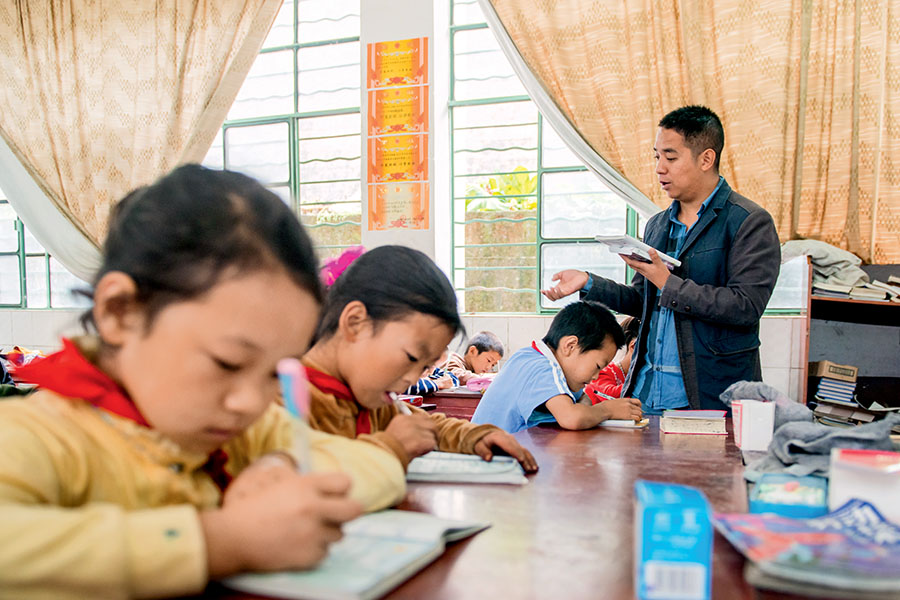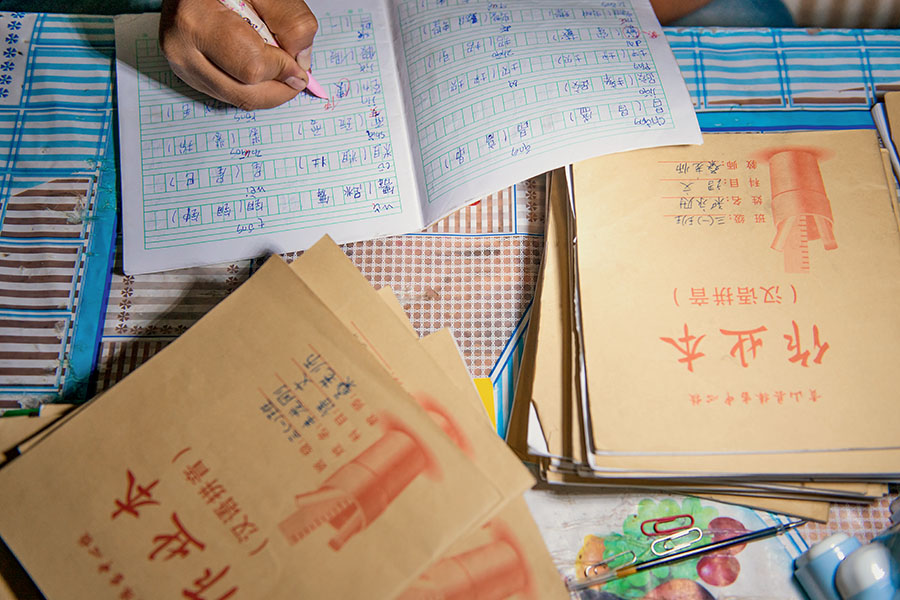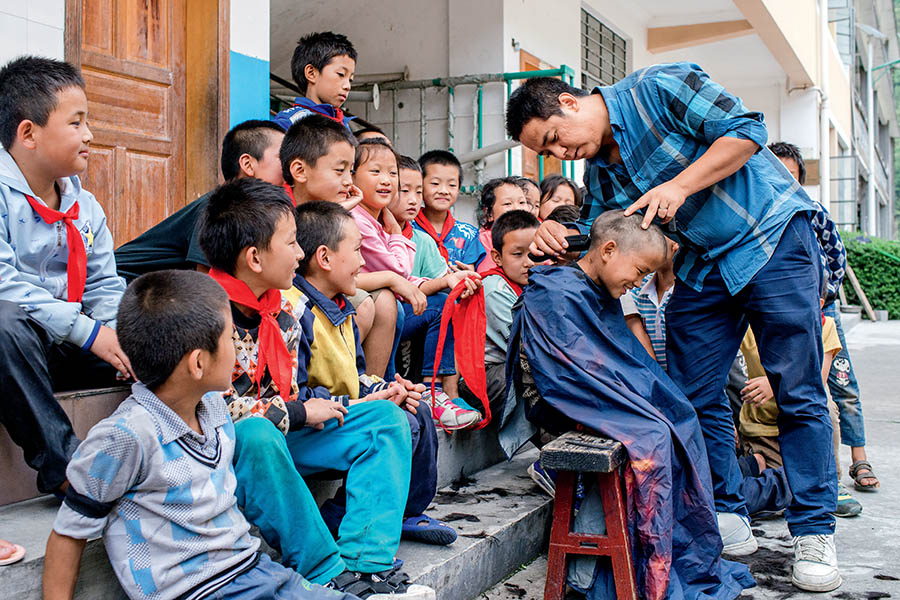Sang Lei: Specially-recruited Teacher in Deep Mountains

“When you look up, you see mountains, but when you look down, you also see mountains,” declares Sang Lei. “Behind the mountain ranges are more soaring mountain ranges.” This is the environment around Pengdang Wanquan Elementary School in Yunnan Province, where Sang has been working as a specially-recruited teacher for nine years.
Born in Fugong County, Yunnan Province, in 1985, Sang Lei from the Nu ethnic group graduated from Pu’er University at the age of 22 with a bachelor’s degree in computer education. After graduation, he began to teach at the rural elementary school in Pengdang Township in Gongshan Dulong and Nu Autonomous County.
Specially-recruited teachers are nothing new in China, but have received increasing attention in recent years. In 2006, China launched a governmental program to spread compulsory education in rural areas of the country’s central and western parts and improve the quality of rural education. By recruiting university graduates to work as rural teachers, the program coined the term “specially-recruited teachers.” Over the past decade, over 500,000 graduates like Sang Lei have ventured to 30,000 rural schools in more than 1,000 counties in central and western China.

Although Pengdang Wanquan Elementary School is small, the institution is a big deal for the area’s school-aged children. Some students live nearby, but others walk for seven to eight hours from their homes to reach the school. Dimaluo Village, deep in the mountains, is the most remote and inaccessible village in the elementary school’s district. Because of the difficult journey, Sang and other teachers escort those students home for holidays and festivals.
“Highways take kids out of the mountains, but only education will lead them away from the mountains in any real sense,” declares Sang. “As teachers, we shoulder tremendous responsibility.”
Change Starts with Kids
In 2007, when Sang arrived in Pengdang, he became the first elementary school teacher with a bachelor’s degree in the township. Due to staffing shortages, Sang taught subjects ranging from Chinese, ethics, music and art to English, as well as being a leading class teacher and the head of a research group. Serving as a rural teacher is never easy, but Sang has made every day at the school as bright as possible. During his nine years, Sang has visited many students’ homes by riding a small motorcycle through the mountains. Because his students come from many different ethnic groups, Sang has learned the Tibetan and Lisu languages himself to better communicate with students and their parents. He has used the internet to reach out to philanthropists and collected more than 10,000 donated books. He has learned to play the drum and tambourine in order to teach them to his students, because “music and art are crucial for developing aesthetics.”

“At first, I just wanted to try teaching in Pengdang,” reveals Sang. “I knew I could still take the civil service exam after three years at the school, in accordance with the specially-recruited teacher program.” Upon arrival, he immediately regretted his decision: “I searched the whole town for an electric rice cooker, but came up empty. The best I could find was some noodles and a bottle of meat sauce.” Eventually, he learned from the locals that shopping happens on Mondays, when various vendors travel to the town, and that he would have to wait a week. “My first week here, I ate noodles with meat sauce for three days and instant noodles the next four.”
“For quite a while, I only looked forward to getting out of here,” adds Sang. “However, my mind was changed by the trust I built with my students and a renewed sense of responsibility.”
Like Teacher, Like Family
By Sang’s third year in Pengdang, his mind was fundamentally changed.
One evening, some fourth-graders came to see him. A little girl had fallen and hurt her hand. She was an orphan who lived with her uncle’s family, but her uncle had gone to Tibet to work. Sang assumed the role of the girl’s temporary guardian and took her to a hospital in the county seat. There, a doctor confirmed that she had fractured a bone in her left hand that would require surgery. During the surgery, the girl held Sang’s hand tight, and never said a word despite becoming soaked in sweat due to the pain.
Afterwards, the girl wrote a note to Sang that read:
“Teacher Sang, do you know why I didn’t cry during the surgery? My father and mother are gone. When you came with me to surgery yesterday, I felt like my father had returned. How could I cry in front of my father?”
“I suddenly realized how much I meant to these kids,” says Sang. “I’m their only spiritual support.” After that experience, he made up his mind to stay and teach there.

Pengdang Wanquan Elementary School is a boarding school, so Sang has become like family for many students. Some students lacked personal hygiene because their parents were working in far-off cities or simply too poor; they were in dire need of a haircut. Sang acts as a stylist and offers this service to kids in need each month. His tools are simple: a pair of old shears and a plastic sheet. For the kids, the haircut day is like a holiday. They laugh, play, and smile brightly while waiting their turn.
Nightly patrols for Pengdang Wanquan Elementary School require a teacher to touch each student’s forehead to check their temperature and ask if anyone feels ill. In many parts of China, especially remote areas, teachers become healthcare providers. Sang soon conformed to the common local practice of leaving his door unlocked at night: the local people are simple and honest, and the children may need to wake him in case of an emergency.
“As far as I am concerned, teaching deep in the mountains requires far more than planning lessons and correcting homework,” Sang grins. During his nine-year tenure at the school, he has become emotionally tied to his students. “We spend almost every day together. Sometimes I’m the nanny, sometimes security and sometimes the doctor. But at the end of the day, we are always family. “